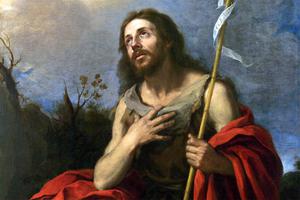St. John the Baptist and Your Gift of Prophecy
If you want to speak the truth, you have to know Truth himself.

I was born two weeks late during a hot, humid St. Louis summer. My mother, who never complains of physical discomforts, claims that she does not remember being particularly uncomfortable during that time of waiting, but perhaps she just has forgotten. I was stubborn from the beginning. My mother had hoped for a family birth, but I waited to be born until my two older sisters were taken out of the delivery room by my grandmother for a snack.
I took my first breath on the Nativity of St. John the Baptist, and was given a name that my parents had prayed long and hard about. Because of this I have long been devoted to my “birthday buddy” relating to his call to contemplation and prophecy. When I followed my call into the married life I realized that I while I had not chosen the “better part” of Mary, even my life as a Martha made way for a closeness to and constant companionship with God with a irrepressible desire to bear witness to God.
Yet, this call of mine is not unique to me, it is for all of Christians, from the moment we are anointed at our baptisms we share in Christ’s life as priest, prophet and king. As prophets we are to bear witness to God to the world.
There was a man sent from God, whose name was John.
He came for testimony, to bear witness to the light, that all might believe through him.
He was not the light, but came to bear witness to the light. (John 1:6-8)
We are all called to be like St. John the Baptist by living our lives in radical separation from the world. For some it is the call to religious life, but for those of us who are lay people and always will be our radical separation must be in our hearts.
Thomas Merton wrote a poem meditating on the Visitation and the moment of St. John the Baptists quickening, when he was cleansed from Original Sin. Merton applied the fleeing of Our Blessed Mother to cousin as a leaving of the world, and talked about the beauty of the contemplative vocation.
Her salutation
Sings in the stone valley like a Charterhouse bell:
And the unborn saint John
Wakes in his mother's body,
Bounds with the echoes of discovery.Sing in your cell, small anchorite!
How did you see her in the eyeless dark?
What secret syllable
Woke your young faith to the mad truth
That an unborn baby could be washed in the Spirit of God?
Oh burning joy!What seas of life were planted by that voice!
With what new sense
Did your wise heart receive her Sacrament,
And know her cloistered Christ?(from “The Quickening of John the Baptist,” from The Tears of the Blind Lion)
I love the imagery of St. John the Baptist and Our Lord in their little cloisters of their mother’s wombs, and it evokes in my imagination the idea that all of our hearts are our own little cloisters. I can make a place for God and me to dwell alone and together in the depths of my heart. I can place myself with him no matter where I am and what I am doing. Your heart and my heart, as St. Augustine talks about in his Confessions were meant for God alone — and they are restless without him.
St. Francis de Sales in his chapter on how to pray in The Introduction to the Devout Life talks about the practice of placing oneself in God’s presence as much as one can throughout one’s day. He explains that we can do this no matter how busy we are.
Seek frequently to aspire after God by short but ardent efforts of your heart; admire His beauty, invoke His aid, cast yourself in spirit at the foot of His Cross, adore His goodness, often inquire of Him concerning your salvation; a thousand times in the day offer your soul to Him; fix your inward eyes upon His sweetness; hold out your Hadn to Him as a child to his father, that He may guide you. (Introduction to the Devout Life, II.8)
Yet, this is not enough if we are going to be the kind of prophets God is calling us to be. We must foster an even deeper contemplation of God, by making time daily for solitary, mental prayer — and actually doing it. We must go out of our way to spend time in the presence of the Holy Eucharist. We must unite our hearts with our Blessed Mother by meditating on the mysteries of the Rosary. And we must take time to pray with the Scriptures, perhaps starting first with the daily Mass readings.
St. John the Baptist did not become a prophet in one day, but he spent his life “in the wilderness till the day of his manifestation to Israel.” (Luke 1:80). His life was spent in contemplation and love of God. If we as Christians are going to live out our prophetic calling that was sealed in our souls at Baptism, we have to foster it by grounding ourselves in God. If you want to speak the truth, you have to know Truth himself. When you do, you will be able to say along with St. John the Baptist, “Behold the Lamb of God,” and people will hear you and follow him.
This article originally appeared June 24, 2018, at the Register.
- Keywords:
- st. John the baptist
- prophecy















